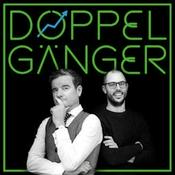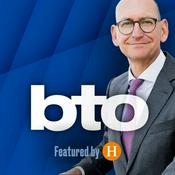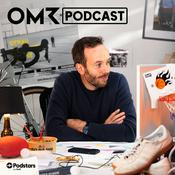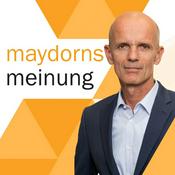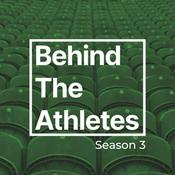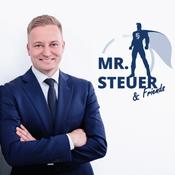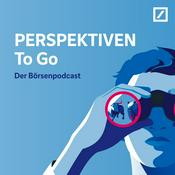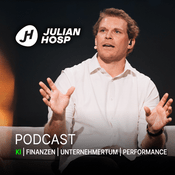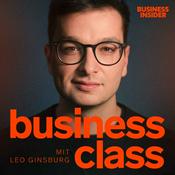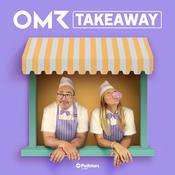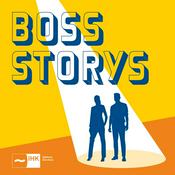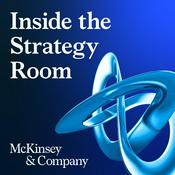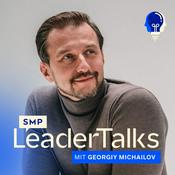45 Episoden
Niyum Gandhi, CFO of Mass General Brigham & Mike Desjadon, CEO of Anomaly: Why hospitals are increasingly falling into the red
03.2.2026 | 45 Min.This week on Lifers, Niyum Gandhi, CFO of Mass General Brigham, and Mike Desjadon, CEO of Anomaly, discuss the financial pressures facing health systems today. They cover why hospital expenses are rising faster than revenue, what health systems actually look for when evaluating startups, and why collaboration matters more than finger-pointing.—SPONSOR:This episode is brought to you by Arbiter. As Michelle says: "We don't need another instrument for the orchestra—we need to conduct the orchestra." Backed by one of the largest early funding rounds in health tech, Arbiter creates one real-time source of truth from fragmented healthcare systems, then routes referrals and handles prior auths so patients actually get to care. Learn more at https://www.arbiter.ai/.
—LINKS: Mass General Bringham: https://www.massgeneralbrigham.org/en Anomaly: https://www.findanomaly.com/
Lifers: How money really flows in healthcare with Claimable CEO Warris Bokhari & Anomaly CEO Mike Desjadon: https://www.youtube.com/watch?v=mxuZ889ww-I Sachin Jain Episode: https://www.youtube.com/watch?v=Tvtakm7NMnI
Chrissy Farr’s Website: https://www.chrissyfarr.com/ Subscribe to the Second Opinion Newsletter: https://secondopinion.media/ Chrissy’s Book: The Storyteller's Advantage: https://www.chrissyfarr.com/books
Lifers with Christina Farr on YouTube: https://www.youtube.com/@LiferswithChristinaFarr
—FOLLOW:Niyum:https://www.linkedin.com/in/niyum-gandhi/ https://x.com/niyumgandhi
Mike:https://www.linkedin.com/in/mike-desjadon-4a0a21a/ https://x.com/Mike_Desjadon Chrissy:https://www.linkedin.com/in/christinafarr/ https://x.com/chrissyfarr —TIMESTAMPS:(00:00) Preview(01:24) Intro(02:28) How Niyum and Mike first met at Mount Sinai(05:55) Career path and the move to CFO of Mass General Brigham(11:53) Why choose a career in healthcare(15:19) Sponsor: Arbiter(15:50) Current financial state of American health systems(19:28) Addressing the revenue and expense trend gap(21:26) The role of AI and technology in productivity(26:07) Ambient documentation and physician burnout(29:58) Strategic partnerships versus point solution vendors(31:40) The evolution of healthcare startups and health systems(36:31) Advice for founders building in the industry(40:34) WrapDr. Kameron Matthews & Inlightened President Shelli Pavone on saving primary care from collapse
13.1.2026 | 45 Min.Dr. Kameron Matthews (Chief Health Officer, Impact Care) and Shelli Pavone (President & Co-Founder, Inlightened) join Chrissy Farr to tackle healthcare's biggest challenges: the Medicaid crisis, state licensing chaos, the death of primary care, and why Silicon Valley keeps getting it wrong.
—SPONSOR:This episode is brought to you by Inlightened.Healthcare innovation doesn’t fail for lack of ideas; it fails when real clinical expertise is missing. Inlightened connects innovators with vetted, diverse healthcare professionals for paid research, advisory, and consulting work, helping companies build solutions grounded in reality.
Healthcare professionals can sign up to share their expertise and get paid, and companies can directly access expert insights at getinlightened.com.
—LINKS: Inlightened:https://www.linkedin.com/company/getinlightened/ https://www.facebook.com/getinlightened/ https://twitter.com/GetInlightened
Doctors getting multiple licenses: https://www.cnbc.com/2019/10/13/telemedicine-doctors-are-getting-licenses-in-all-50-states.html
Chrissy Farr’s Website: https://www.chrissyfarr.com/ Subscribe to the Second Opinion Newsletter: https://secondopinion.media/ Chrissy’s Book: The Storyteller's Advantage: https://www.chrissyfarr.com/books
Lifers with Christina Farr on YouTube: https://www.youtube.com/@LiferswithChristinaFarr
—FOLLOW:Kameron: https://www.linkedin.com/in/kameronmatthews/
Shelli:https://www.linkedin.com/in/shelli-pavone-a729b2/ https://x.com/shellipavone
Chrissy:https://www.linkedin.com/in/christinafarr/ https://x.com/chrissyfarr —TIMESTAMPS:(00:00) Intro(01:24) Health equity and policy landscape(03:15) Challenges in healthcare delivery(05:21) Medicaid and community health(08:49) Entrepreneurship and innovation in healthcare(12:35) Licensing and regulatory hurdles(19:28) Encouraging the next generation(23:46) The role of social media in healthcare(32:32) AI and the future of primary care(36:17) Rapid fire round(43:48) Wrap- This week on Lifers, Christina Farr sat down with Sachin Jain, CEO of SCAN Health Plan. Sachin makes a compelling case for "radical common sense" in healthcare—the idea that we've normalized dysfunction for so long that simple, patient-centered solutions now feel revolutionary. He challenges the industry's toxic positivity and truth-telling problem, arguing that real change requires leaders to acknowledge what's broken in their own backyards, including calling out his own insurance industry publicly.
—SPONSOR:This episode is brought to you by Arbiter. As Michelle says: "We don't need another instrument for the orchestra—we need to conduct the orchestra." Backed by one of the largest early funding rounds in health tech, Arbiter creates one real-time source of truth from fragmented healthcare systems, then routes referrals and handles prior auths so patients actually get to care. Learn more at https://www.arbiter.ai/.
—LINKS: SCAN Health Plan: https://www.thescangroup.org/ LinkedIn post: https://www.linkedin.com/posts/sachinhjain1_the-revolution-healthcare-actually-needs-activity-7402346091767398400-CVnF?utm_source=share&utm_medium=member_desktop&rcm=ACoAAAWcjXgBb3Jw6dX16PD9lRJSsxfgqVAqZLw The Revolution Healthcare Actually Needs: Radical Common Sense (Forbes): https://www.forbes.com/sites/sachinjain/2025/12/03/radical-common-sense-a-leadership-philosophy-for-healthcare-system/ Health Insurance is Broken ad: https://www.youtube.com/watch?v=q7bty0M9ySA
Chrissy Farr’s Website: https://www.chrissyfarr.com/ Subscribe to the Second Opinion Newsletter: https://secondopinion.media/ Chrissy’s Book: The Storyteller's Advantage: https://www.chrissyfarr.com/books
Lifers with Christina Farr on YouTube: https://www.youtube.com/@LiferswithChristinaFarr
—FOLLOW:Sachin:https://www.linkedin.com/in/sachinhjain1/
Chrissy:https://www.linkedin.com/in/christinafarr/ https://x.com/chrissyfarr
—TIMESTAMPS:
(00:00) Intro(02:27) Innovative solutions in healthcare(04:28) Challenges in healthcare communication(06:06) The broken culture of healthcare leadership(14:10) Mentorship and career advice(18:02) Sponsor: Arbiter(18:33) Concierge medicine and longevity(23:05) The system's shortcomings and individual choices(24:38) Medical anxiety and consumerism in healthcare(25:35) The role of primary care physicians(26:07) AI in healthcare: opportunities and limitations(29:48) Employer-sponsored health insurance issues(35:20) The cost crisis and technological challenges(40:13) The role of social media in healthcare leadership(44:49) Wrap How money really flows in healthcare with Claimable CEO Warris Bokhari & Anomaly CEO Mike Desjadon
16.12.2025 | 39 Min.This week on Lifers, Christina Farr sat down with Mike Desjadon, CEO of Anomaly and Warris Bokhari CEO of Claimable. They discuss automating patient appeals, the challenges of the current payment model, and their approach to working directly with patients. They share insights on denial rates, what they've learned from claim files, and why they believe healthcare needs more direct challengers.
—SPONSOR:This episode is brought to you by Arbiter. As Michelle says: "We don't need another instrument for the orchestra—we need to conduct the orchestra." Backed by one of the largest early funding rounds in health tech, Arbiter creates one real-time source of truth from fragmented healthcare systems, then routes referrals and handles prior auths so patients actually get to care. Learn more at https://www.arbiter.ai/.
—LINKS:Anomaly: https://www.findanomaly.com/ Claimable: https://www.getclaimable.com/
Chrissy Farr’s Website: https://www.chrissyfarr.com/ Subscribe to the Second Opinion Newsletter: https://secondopinion.media/ Chrissy’s Book: The Storyteller's Advantage: https://www.chrissyfarr.com/books
Lifers with Christina Farr on YouTube: https://www.youtube.com/@LiferswithChristinaFarr
—FOLLOW:Warris:https://www.linkedin.com/in/warrisbokhari https://x.com/warrisbokhari
Mike:https://www.linkedin.com/in/mike-desjadon-4a0a21a/ https://x.com/Mike_Desjadon
Chrissy:https://www.linkedin.com/in/christinafarr/ https://x.com/chrissyfarr
—TIMESTAMPS:(00:00) Intro(03:18) Warris’ journey from corporate to startup(07:36) The problem with healthcare payment models(08:57) Claimable's mission and approach(12:14) Challenges and strategies in healthcare advocacy(16:21) Real stories of healthcare denials(20:28) Complexities of surgery and healthcare incompetence(21:08) Sponsor: Arbiter(21:39) Impact of Claimable on the insurance market(23:37) Challenges and innovations in revenue cycle management(24:52) The role of venture capital in healthcare(27:19) Denial rates and revenue cycle management(33:04) The importance of being a challenger in healthcare(37:32) WrapV Bento, Sword Health CEO: Building real clinical AI (not API wrappers), outcomes pricing, and winning from Portugal
09.12.2025 | 38 Min.In this episode of Lifers, Christina Farr engages in an insightful conversation with V, CEO of Sword Health. V shares his unconventional journey from Portugal to the U.S. healthcare market, emphasizing the importance of providing high-quality care to reduce overall healthcare costs.
—SPONSOR:This episode is brought to you by Arbiter. As Michelle says: "We don't need another instrument for the orchestra—we need to conduct the orchestra." Backed by one of the largest early funding rounds in health tech, Arbiter creates one real-time source of truth from fragmented healthcare systems, then routes referrals and handles prior auths so patients actually get to care. Learn more at https://www.arbiter.ai/.
—LINKS: Sword Health: https://swordhealth.com/
Chrissy Farr’s Website: https://www.chrissyfarr.com/ Subscribe to the Second Opinion Newsletter: https://secondopinion.media/ Chrissy’s Book: The Storyteller's Advantage: https://www.chrissyfarr.com/books
Lifers with Christina Farr on YouTube: https://www.youtube.com/@LiferswithChristinaFarr
—FOLLOW:V:https://www.linkedin.com/in/vbento/
Chrissy:https://www.linkedin.com/in/christinafarr/ https://x.com/chrissyfarr
—TIMESTAMPS:(00:00) Intro(01:07) Meet V Bento(01:52) Journey to the US healthcare market (03:53) Challenges in the US healthcare system (05:05) Value-based care and incentives (07:49) Digital health and technology (14:11) Sponsor: Arbiter(15:12) AI in healthcare: Opportunities and limitations (22:16) Balancing work and family (32:12) Company culture and employee success (36:32) Wrap
Weitere Wirtschaft Podcasts
Trending Wirtschaft Podcasts
Über Lifers with Christina Farr
Veteran journalist, investor, and Second Opinion Media founder Chrissy Farr talks with the CEOs and founders who've been in the trenches long enough to know that healthcare doesn't move at startup speed. These aren't the entrepreneurs chasing quick exits—they're the "lifers" who understand that building in healthcare requires endless pivots, regulatory navigation, and decade-long timelines.
No hype, just honest conversations about what it really takes.
Each episode explores healthcare innovation, startup strategy, medical technology and AI, health system transformation, and investment insights from operators who've navigated regulatory challenges, clinical trials, reimbursement complexities, and the unique dynamics of the healthcare industry.
Podcast-WebsiteHöre Lifers with Christina Farr, Handelsblatt Morning Briefing - News aus Wirtschaft, Politik und Finanzen und viele andere Podcasts aus aller Welt mit der radio.de-App
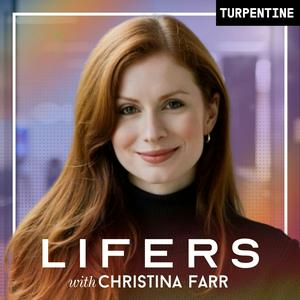
Hol dir die kostenlose radio.de App
- Sender und Podcasts favorisieren
- Streamen via Wifi oder Bluetooth
- Unterstützt Carplay & Android Auto
- viele weitere App Funktionen
Hol dir die kostenlose radio.de App
- Sender und Podcasts favorisieren
- Streamen via Wifi oder Bluetooth
- Unterstützt Carplay & Android Auto
- viele weitere App Funktionen


Lifers with Christina Farr
Code scannen,
App laden,
loshören.
App laden,
loshören.








